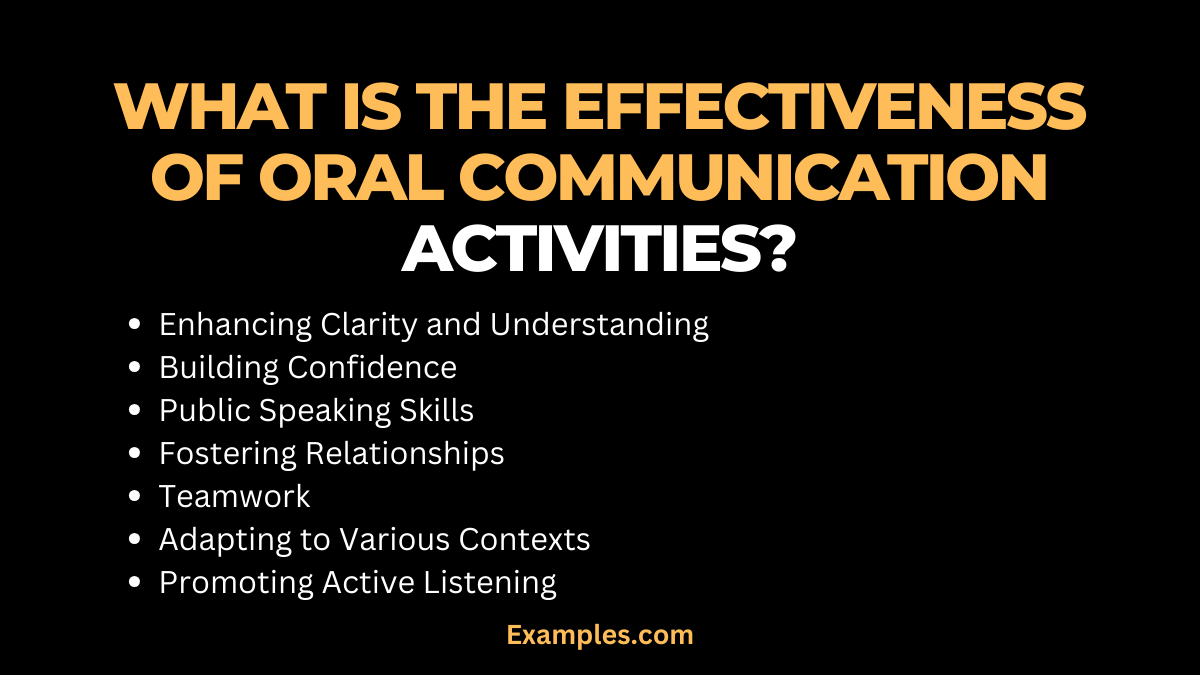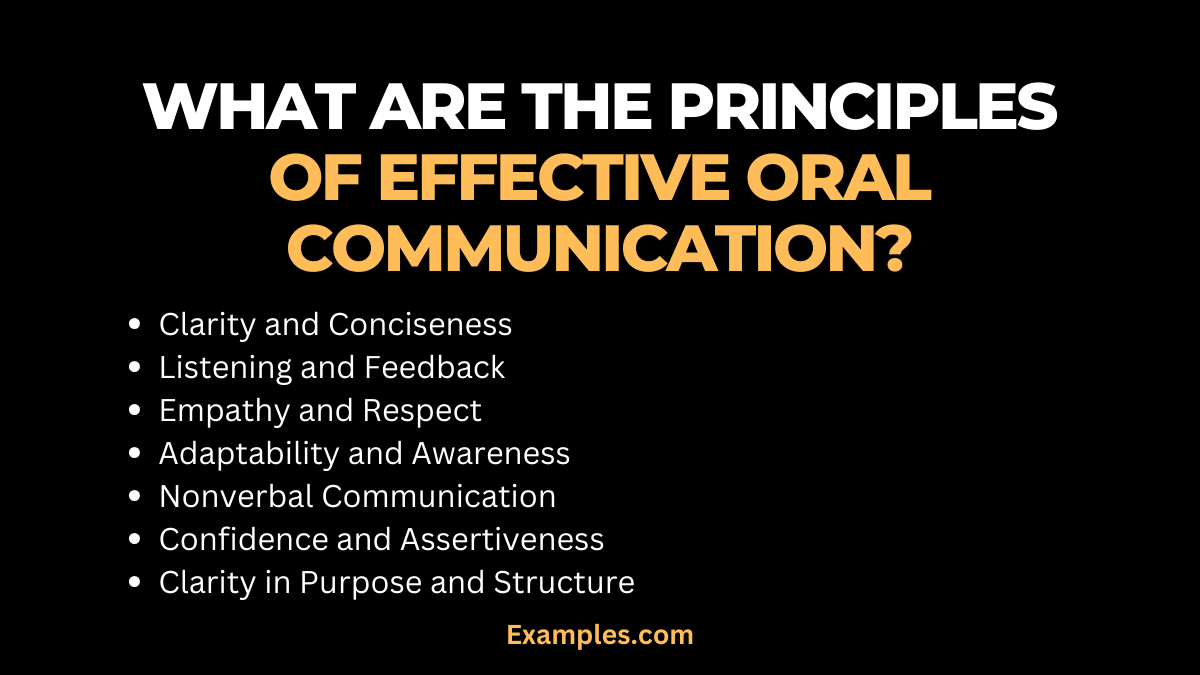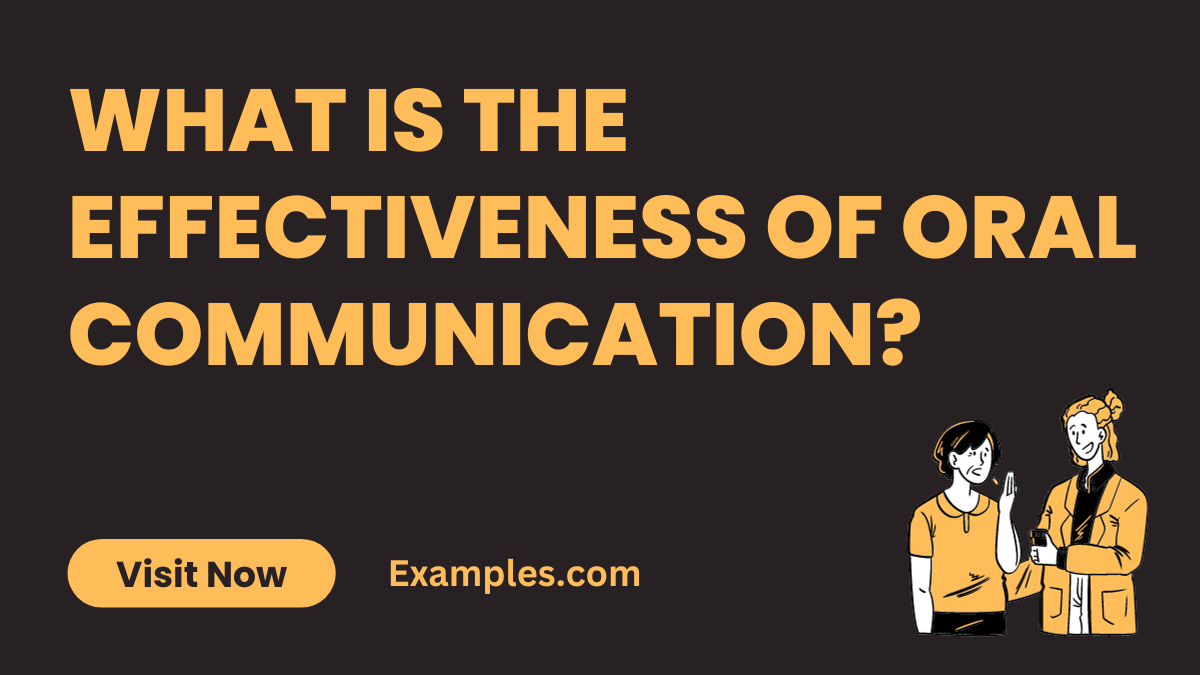What is the Effectiveness of Oral Communication?
Oral communication, the art of expressing ideas verbally, is pivotal in our daily interactions. This guide delves into the effectiveness of oral communication, highlighting its impact on personal and professional relationships. We’ll explore various communication examples to understand how effective oral communication facilitates understanding, builds connections, and persuades audiences. From workplace negotiations to everyday conversations, mastering this skill is essential for conveying messages clearly and effectively. Join us in uncovering the secrets to successful oral communication, a tool that empowers and connects.
What is the Best Example for Effectiveness of Oral Communication?
One of the best examples of the effectiveness of oral communication is in leadership and motivational speaking. Leaders and motivational speakers utilize oral communication to inspire and influence their audience. They skillfully combine elements like tone, clarity, and emotion to deliver powerful messages that resonate with their listeners. This form of communication proves effective in altering perceptions, motivating change, and instilling confidence in individuals.
Another prime example is in customer service. Here, oral communication skills are essential for understanding customer needs and providing solutions. Effective verbal interaction in customer service not only resolves issues efficiently but also builds trust and loyalty. This is particularly significant in industries where customer satisfaction is paramount. The ability to articulate responses clearly and empathetically in customer service scenarios underscores the power of effective oral communication and its role in building customer relationships.
What is the Effectiveness of Oral Communication Activities?

Oral communication activities are vital in enhancing the way we convey and receive messages. Their effectiveness is rooted in several key aspects:
Enhancing Clarity and Understanding
- Direct Interaction: These activities allow for immediate clarification, reducing misunderstandings.
- Personalized Feedback: Participants can receive and give instant feedback, which aids in refining communication skills.
Building Confidence and Public Speaking Skills
- Practice and Exposure: Regular engagement in oral communication activities builds confidence, especially in public speaking settings.
- Skill Development: Activities like debates and presentations hone public speaking and persuasion skills.
Fostering Relationships and Teamwork
- Enhanced Interpersonal Skills: These activities improve one’s ability to relate to others, enhancing both personal and professional relationships.
- Team Cohesion: Group communication activities encourage teamwork and collaboration.
Adapting to Various Contexts
- Contextual Flexibility: Participants learn to modify their communication style according to different situations.
- Cultural Awareness: Exposure to diverse groups enhances understanding and adaptability in communication.
Promoting Active Listening
- Improved Listening Skills: Activities often focus on active listening, a key component of effective communication.
- Empathy Development: Understanding different perspectives through active listening fosters empathy.
In essence, the effectiveness of oral communication activities lies in their ability to improve our communication skills in real-time, practical settings, making them indispensable tools for personal and professional growth.
What Does the Effectiveness of Oral Communication Depend On?
The effectiveness of oral communication relies on several key factors, each playing a crucial role in ensuring that the spoken message is not only conveyed but also understood and acted upon effectively.
Clarity of Message
- Precise Language: The use of clear, unambiguous words to avoid misunderstandings.
- Structured Delivery: Organizing thoughts logically to aid in comprehension.
Speaker’s Ability
- Articulation Skills: Pronouncing words clearly and using appropriate intonation.
- Confidence: Presenting information confidently to engage the audience.
Listening Skills
- Active Listening: Giving undivided attention to the speaker and showing understanding.
- Feedback Mechanisms: Using questions and summaries to clarify and confirm understanding.
Nonverbal Communication
- Body Language: Enhancing the message with appropriate gestures and facial expressions.
- Eye Contact: Establishing a connection with the audience and gauging their response.
Audience Engagement
- Understanding the Audience: Tailoring the message to the audience’s level of knowledge and interests.
- Interactive Communication: Encouraging dialogue and participation from the audience.
Environmental Factors
- Appropriate Setting: Choosing a suitable environment that is conducive to effective communication.
- Minimizing Distractions: Reducing or eliminating background noise and interruptions.
Each of these components significantly impacts the effectiveness of oral communication. Mastery in these areas contributes to the speaker’s ability to convey their message effectively, ensuring that their communication is not just heard but also understood and remembered.
What are the Principles of Effective Oral Communication?

Effective oral communication is more than just talking; it involves several key principles that enhance the clarity and impact of spoken words. By understanding and implementing these principles, individuals can significantly improve their verbal interactions.
Clarity and Conciseness
- Clarity: Ensuring that the message is clear and easily understood. Avoiding jargon and complex language when unnecessary.
- Conciseness: Being brief and to the point, avoiding unnecessary repetition or verbosity.
Listening and Feedback
- Active Listening: Paying full attention to the speaker, showing interest, and understanding their message.
- Feedback: Providing constructive feedback or clarification to ensure mutual understanding.
Empathy and Respect
- Empathy: Understanding and acknowledging the feelings and perspectives of others.
- Respect: Showing respect for the listener, regardless of differing viewpoints or opinions.
Adaptability and Awareness
- Audience Awareness: Tailoring the message to suit the audience’s background, knowledge, and preferences.
- Contextual Adaptability: Adjusting the tone, style, and content of communication to match the situation.
Nonverbal Communication
- Body Language: Using gestures, facial expressions, and posture to reinforce spoken words.
- Eye Contact: Maintaining appropriate eye contact to engage the listener and convey sincerity and confidence.
Confidence and Assertiveness
- Confidence: Speaking with certainty to convey your message effectively.
- Assertiveness: Expressing your thoughts and opinions firmly while respecting others.
Clarity in Purpose and Structure
- Purpose-Driven: Clearly defining the objective of the communication.
- Structured Approach: Organizing the content logically with a distinct introduction, body, and conclusion.
By integrating these principles into oral communication, individuals can significantly enhance the effectiveness of their interactions, ensuring their message is not only heard but also understood and respected.
How Can You Improve Oral Communication Effectiveness?
Enhancing the effectiveness of oral communication is essential for successful interactions in both personal and professional settings. Here are strategies to elevate your oral communication skills:
Understand Your Audience
- Audience Analysis: Tailor your message by understanding the audience’s background, needs, and expectations.
- Adjust Your Approach: Modify your communication style based on the audience’s preferences.
Clear and Concise Messaging
- Clarity of Thought: Organize your ideas logically before speaking.
- Brevity: Keep your message concise to maintain the audience’s attention.
Effective Use of Tone and Body Language
- Tone Variation: Use varied intonation to emphasize key points.
- Positive Non-Verbal Cues: Reinforce your words with appropriate gestures, facial expressions, and eye contact.
Active Listening
- Feedback Reception: Encourage and attentively listen to feedback.
- Paraphrasing: Summarize or clarify points to ensure mutual understanding.
Regular Practice
- Practice Sessions: Regularly practice speaking in various contexts.
- Seek Opportunities: Engage in public speaking, debates, or discussions.
Self-Reflection and Feedback
- Reflect on Performance: After each communication, evaluate what went well and what could be improved.
- Seek Constructive Criticism: Ask for feedback from peers, mentors, or coaches.
By implementing these tactics, you can significantly improve your oral communication effectiveness, ensuring that your messages are received and understood as intended.
In conclusion, the effectiveness of oral communication extends far beyond mere information exchange. It is a vital tool for building relationships, fostering trust, and facilitating collaboration in various spheres of life. Whether in personal conversations, professional meetings, or public speaking events, the ability to communicate orally with clarity, empathy, and confidence is a skill that yields significant benefits. It enhances our ability to connect with others, share ideas, and understand diverse perspectives, thereby enriching our personal and professional lives.
To further explore the intricacies of effective oral communication and its impact, resources such as Harvard University’s Guide to Effective Speaking provide valuable insights. Additionally, the American Management Association offers a comprehensive overview of key communication principles that can be applied in various contexts. These external resources, from esteemed educational and professional organizations, offer in-depth knowledge and practical tips to enhance oral communication skills, making them invaluable for anyone looking to improve their communicative abilities.



